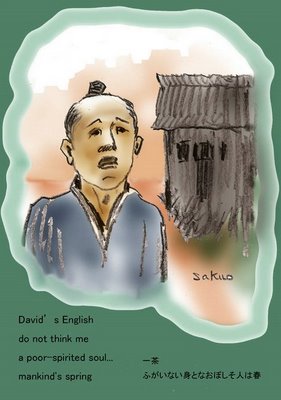
by Issa,1822, Age 60
sakuo comment
It is hard work to cultivate rice field in snow falling.
Nothing to say, there is no renku.
David's comment
This haiku alludes to the crunching or chopping sound made by a plow.
 by Issa 1810
by Issa 1810


 1815 Issa on the first day of the year.
1815 Issa on the first day of the year. Issa original
Issa original
 Issa original 1824
Issa original 1824
 Issa original, 1806 Age 44 staying in Edo.
Issa original, 1806 Age 44 staying in Edo.


 David’s English
David’s English


 David’s English
David’s English


 David’s English
David’s English
 David’s English
David’s English

